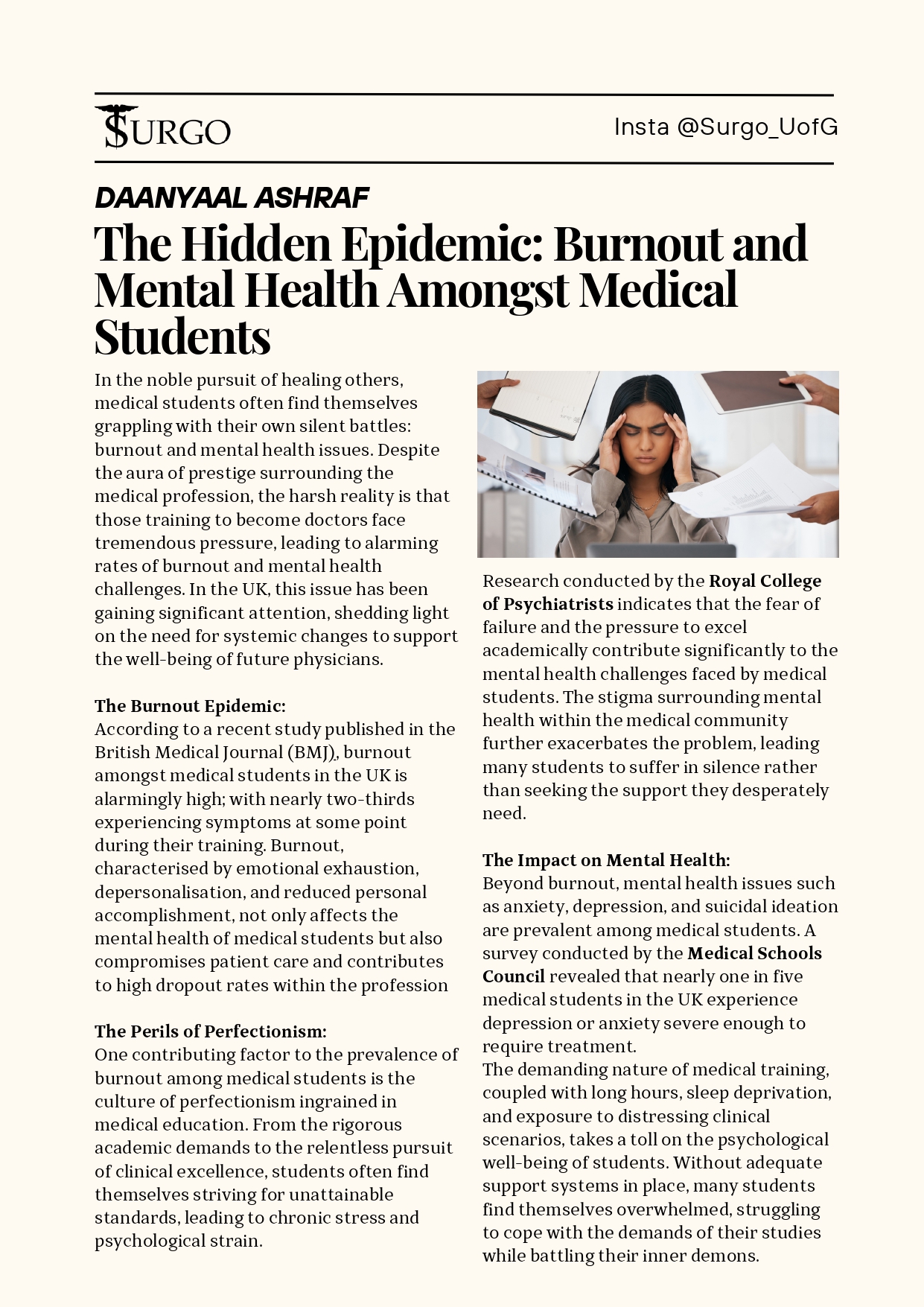The Hidden Epidemic: Burnout and Mental Health Amongst Medical Students
DOI:
https://doi.org/10.36399/Surgo.1.297Abstract
In the noble pursuit of healing others,
medical students often find themselves
grappling with their own silent battles:
burnout and mental health issues. Despite
the aura of prestige surrounding the
medical profession, the harsh reality is that
those training to become doctors face
tremendous pressure, leading to alarming
rates of burnout and mental health
challenges. In the UK, this issue has been
gaining significant attention, shedding light
on the need for systemic changes to support
the well-being of future physicians.
The Burnout Epidemic:
According to a recent study published in the
British Medical Journal (BMJ
), burnout
amongst medical students in the UK is
alarmingly high; with nearly two-thirds
experiencing symptoms at some point
during their training. Burnout,
characterised by emotional exhaustion,
depersonalisation, and reduced personal
accomplishment, not only affects the
mental health of medical students but also
compromises patient care and contributes
to high dropout rates within the profession
The Perils of Perfectionism:
One contributing factor to the prevalence of
burnout among medical students is the
culture of perfectionism ingrained in
medical education. From the rigorous
academic demands to the relentless pursuit
of clinical excellence, students often find
themselves striving for unattainable
standards, leading to chronic stress and
psychological strain.
Research conducted by the Royal College
of Psychiatrists indicates that the fear of
failure and the pressure to excel
academically contribute significantly to the
mental health challenges faced by medical
students. The stigma surrounding mental
health within the medical community
further exacerbates the problem, leading
many students to suffer in silence rather
than seeking the support they desperately
need.
The Impact on Mental Health:
Beyond burnout, mental health issues such
as anxiety, depression, and suicidal ideation
are prevalent among medical students. A
survey conducted by the Medical Schools
Council revealed that nearly one in five
medical students in the UK experience
depression or anxiety severe enough to
require treatment.
The demanding nature of medical training,
coupled with long hours, sleep deprivation,
and exposure to distressing clinical
scenarios, takes a toll on the psychological
well-being of students. Without adequate
support systems in place, many students
find themselves overwhelmed, struggling
to cope with the demands of their studies
while battling their inner demons
Addressing the Crisis:
Recognising the urgent need to address
burnout and mental health issues among
medical students, universities and
healthcare institutions are beginning to
implement proactive measures to support
student well-being. From mental health
counseling services to peer support
networks and wellness initiatives, efforts
are underway to create a more nurturing
and supportive learning environment for
future physicians.
Additionally, initiatives such as the
#MentalMovement within the medical
community are working to reduce the
stigma surrounding mental health and
encourage open conversations about the
challenges faced by medical students and
professionals alike. By fostering a culture of
compassion and understanding, these
initiatives aim to break down barriers to
seeking help and promote a healthier
approach to medical education and practice.
The prevalence of burnout and mental
health issues among medical students in the
UK is a pressing concern that demands
immediate attention. As future guardians of
public health, it is imperative that we
prioritize the well-being of those entrusted
with the responsibility of caring for others.
By addressing the root causes of burnout,
challenging the culture of perfectionism,
and fostering a supportive learning
environment, we can create a brighter and
healthier future for medical students and
the patients they serve.
Now we want YOUR opinions on this.
burnout and mental health are subjects
which are hard to talk about as medical
student so we would love to hear about your
thoughts and opinions. If you have 5 minutes
to fill in the google form below it would be
greatly appreciated.


